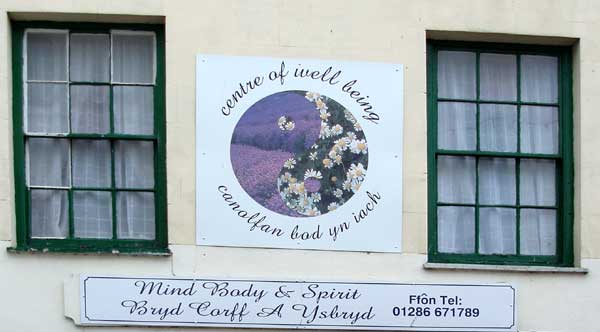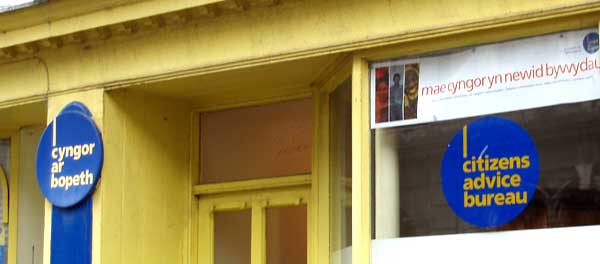... what it says on the tin.
But is it Welsh?
When you're putting up a shop sign you normally look for some striking or clever title for the premises and, if you are going to add a description of your wares, you like to embroider them a little with a hint of pretension or a romantic thought.
That's all very well when you're operating in only one language. What if you have to do it simultaneously in two languages. That's were the real test comes and where the skill and empathy of the translator show through.
On a recent visit to Wales I came across the following efforts which would progressively drive you to despair.
|

This is a plodders version. It translates the English language script directly. Canolfan is quite literally the place in the middle, and though it is the standard Welsh phrase for a centre, it is purely ploddy descriptive. Well being has a ring to it in English, sanctified through usage; bod yn iach is literally being healthy. Mind, body and spirit is pedestrian in English and every bit as much so in Welsh. The impression left with me is of a place where you park yourself for a few hours, just as you would check in your car for a service, and hope the operator/mechanic doesn't make a mess of it.
|

Hardware is a tough one. Even in English it is not quite the opposite of software. But it has been sanctified in use and we all know what it means in the sense of a hardware store. Rising to the challenge this proprietor at least decided to let you know what precisely he is selling - household and garden implements. Of course, at the margin he is now selling all sorts of gifts but on a charitable day you could just about fit them into that description.
|

Siop Eryri (Snowdon Store) is a nice grandiose title and it sells greeting cards in both Welsh and English. The English specifies that they are in fact Greeting Cards while the Welsh simply tells you that they are cards in Welsh. When it came to stationers the signmaker baulked and decided that, just in case, like me, you were getting a bit absent minded, it would be no harm to remind his Welsh viewers, at least, that they are still looking at the same sign as when they started.
|

This one started out well and the Welsh knew they were consulting an optometrist/optegydd. However, when it came to the more modern concepts like contact lenses this signmaker gave up and opted for the same kind of reassurance for the Welsh viewer as he got at the Snowdon Store: this is an optometrists, got that, optometrists, optometrists, optometrists. It seems that the beleaguered Welsh need a lot of reassurance these days. (Check out further nuances.)
|

Now this is really something, and if it doesn't make you smile there is something seriously wrong with you. This guy clearly thought "stuff this for a lark" and just rendered the English terms phonetically with a strong, and I do mean strong, Welsh accent. Honesty is the best policy?
|

Just in case all this is depressing the hell out of you and you are thinking of sending me your psychiatrist's bills, let's look at something a bit more optimistic. This is a citizens advice bureau where the English speaker might expect to be advised on his rights when it comes to dealing with Westminster, Cardiff or the local authorities. The Welsh speaker, meanwhile, is promised cyngor ar bopeth (advice on absolutely everything and anything).
B�aloideas with a vengance.
|

And if you want to be further uplifted, you will have to stay with the local authorities. Y Bont Bridd, the tantalising earthen bridge, is rendered by the commonplace Bridge Street for the English speaker. What earthy local lore is he missing here. For the Welsh to know and for him to find out.
If, on the other hand, you have now been overuplifted, you might like to peruse this page where the linguistic variations testify to a sharp cultural divide. Enjoy!
|
|




